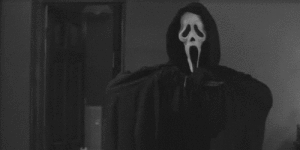Halloween is slowly approaching and there are different ways everyone gets into the festives. Some of these activities include trick or treating, costume parties, watching 13 nights of halloween on abc family and many more. One of the questions I’m wondering is “What happens to your brain during horror movies?
After watching scary movies whether with friends or by myself I always fear going to sleep right away because I’m afraid something bad will happen to me. According to Abigal Marsh, professor of psychology at Georgetown University, she says “We feel fear because we see or hear something that makes us anticipate harm.” You know in the episode of goosebumps with slappy and he’s in the little girls room . During one of the scenes, he’s not in the chair and hope he doesn’t come out of no where and frighten us out of our chair. Well those are the scenes that makes amygdala which is near the front of the brain, become activated. It sends this chemical called glutamate to two other regions of the brain, one that is unknown and the other called hypothalamus. The first regions has the role that tells us to not move one muscle for a few minutes. The hypothalamus “triggers our autonomic nervous system- the system responsible for the fight or flight instinct-when our bodies go into superman mode. This is where our heart goes “lub dub, lub dub” very fast. After a few minutes it goes back to normal with the help of our parasympthetic nervous system.
There was this one study done at Georgia Tech University and the researchers wanted to see what our brain looked like while people watched 10 short clips of horror movies. To record the brain activity of the participants the researchers used this checkerboard. “They found that as suspense increased, the brain “narrowed” participants vision. As suspense ebbed, the visual attention became broader, allowing them to process the scene, as well as the checkerboard.” One of things I wish they expanded on more was the age range of the participants and also how many were apart of this as well. I’m assuming its more than 10 because I don’t think you’d be able to proudce those results with just ten participants. I’d say at you would at least need twenty or more to get good results.
Is the fear we experience from horror movies safe for us though? According to Fischel, a psychology professor from Cali and Los Angeles, he says it’s completely safe. By the end of the movie nothing has happened to us, and we’re still breathing. We need to have that rush every once in a while. Without it, our life would be dull. “That may explain why horror movies are most popular with younger audiences.”
The next time I watch a horror movie like paranormal activity, I know that I will still be alive by the time its over. It’s all fake and I should just enjoy the movie.


I myself get very scared when I watch scary movies. I found it interesting when you talked about how the amygdala is the part of the brain that makes us so scared. I decided to dig deeper and some studies reported it isn’t the amygdala at all but the the visual cortex , insular cortex, thalamus and prefrontal cortex.What also makes people so scared are tension (how scary it is, what exactly the director does), relevance (does the viewer have anything in common with it), and how unreal it is. Although scary movies are so intense, they are also so addictive! Here is a great link for more information on your study.http://filmmakeriq.com/lessons/the-psychology-of-scary-movies/
Really cool post. I’m a horror movie fan so awesome job. I wish you would have talked about why people like horror movies. I found a site that mentions why people like to be scared to induce adrenaline rushes. This is because with the rush of adrenaline we get when we’re scared we also get a rush of dopamine (happiness hormone). Source.. I also think it’s so cool how the sound is what really is the driving force in the fear you feel during a movie. Check out an awesome PBS viedo on it here.
Even the horror movies are fake and but people are still afraid of it. I think that there may be a scale of horror movies for people in different ages and health conditions. I think you might also talk about how horror movies may affect an elder or people with heart problems. After I looked it up, I found this article that mentioned about how people with health problems may be affected in a dangerous way.
I think it would be interesting to see whether or not this increase of brain activity has a neurological effect on sleep patterns. I know for me especially, I can’t sleep after watching these types of movies. I usually just associate this with “being scared”, however is it possible that this increase in brain activity is what is actually causing this lack of sleep? (In could be that these two are in no way connected).